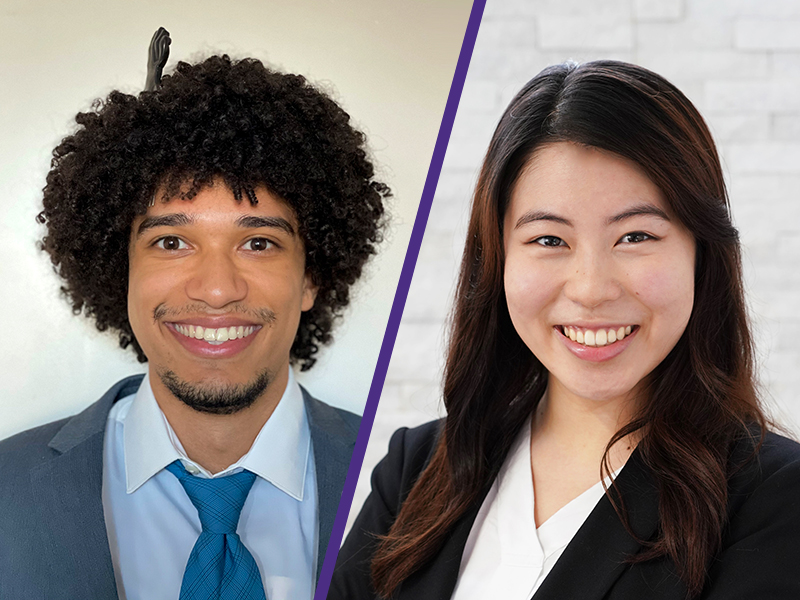The Allen School’s Kyle Johnson and Lisa Orii have been named to the first cohort of recipients of the Quad Fellowship, a scholarship program that recognizes outstanding STEM graduate students from Australia, India, Japan and the United States.
The inaugural 100-member class includes students specializing in a number of disciplines across science, technology, mathematics and engineering. Operated and administered by Schmidt Futures, the Quad Fellowship is designed to spur research efforts and build ties among the next generation of STEM leaders.
Each participating country is represented by 25 Fellows, who are selected for their commitment to advancing innovation for positive social impact. Each Fellow will receive benefits such as funding, cross-cultural exchange through cohort-wide trips, mentorship and participation in regular virtual and in-person workshops on various themes, including the intersection of STEM and society, ethics and innovation, and emerging technologies.
The Quad governments announced the first cohort of Fellows last week.
“It is my great privilege to join the four Quad leaders in welcoming our inaugural cohort of Quad Fellows,” said Tony Woods, executive director of the Quad Fellowship. “The work that our Fellows do during and after their time as Quad Fellows will lead to bold, new inventions and generational breakthroughs in STEM that will enrich the globe for generations to come. At the same time, our scholars will help to build deeper ties between our four nations and renew the power and possibility of collaborative democracy.”
Johnson — one of three U.S. recipients in computer science — is a third-year Ph.D. student advised by Allen School professor Vikram Iyer and also works with Shyam Gollakota in the school’s Mobile Intelligence Lab and adjunct professor Sawyer Fuller, a faculty member in the UW Department of Mechanical Engineering, in the Autonomous Insect Robotics Lab. His research focuses on leveraging low-power actuators, structural properties in systems such as the bistability demonstrated in leaf-out origami, and off-the-shelf electronics to create insect-scale autonomous robots optimized for resource-constrained applications. Johnson also has worked to improve inclusion and access to STEM fields by co-founding A Vision for Electronic Literacy & Access (AVELA) and the University of Washington’s Black Graduate Student Association. He previously has been recognized as a 2021 Generation Google Scholar and inaugural UW + Amazon Science Hub Fellow for his work.
“I’m very grateful for the opportunity to build ties with other STEM professionals through the Quad Fellowship,” Johnson said. “I look forward to meeting a diverse group of students in and outside of my field, and learning how folks from various STEM backgrounds address current global issues. I also know that academia can get daunting, so I aspire to help grow a culture of support amongst the fellows through the highs and lows of our graduate school journeys.”
Orii is a second-year Ph.D. student who works with Allen School professor Richard Anderson in the Information and Communication Technology for Development (ICTD) Lab. She was named as one of the Quad Fellows representing Japan. Her research focuses on the development of human-centered technologies to address barriers associated with stigmatized health conditions, such as HIV and menopause, and improve health care quality and access for vulnerable communities in low-resource settings. Orii was previously recognized as one of MIT Technology Review’s Innovators Under 35 Japan for her work.
“I am very thankful and honored to have been selected into the inaugural cohort of the Quad Fellowship,” Orii said. “I am excited to join a community of researchers who are committed to channeling their skills and knowledge in STEM for social impact. The Quad Fellowship will play a key role in driving my research forward and advancing my mission to empower vulnerable populations and promote health equity. With the fellowship’s financial support, I can actively visit, engage with and collaborate with communities in low-income and low-resource settings on a global scale.
“As a Quad Fellow from Japan,” Orii continued, “I wish to encourage students, especially in my home country, to participate in socially conscious work and recognize that this is not only possible but also valuable.”
UW alum Dellen Behrend, now a master’s student in civil and environmental engineering at the University of California, Berkeley, was also part of the Japan cohort. While an undergraduate student researcher in the UW Biogeotechnics Lab, she focused on the upscaling of bio-cementation soil improvement. She graduated from UW with her bachelor’s in civil engineering in June.
Congratulations to Kyle, Lisa and Dellen!


